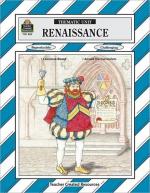|
This section contains 549 words (approx. 2 pages at 300 words per page) |

|
The new prosperity extended beyond royal treasuries. Bankers and traders also became wealthy, creating a merchant class with increasing influence over the monarchy. Medieval notions of social class and mobility changed as those born into common families became richer and more powerful. This newly literate and influential class were eager to reject medieval ways of thinking that had hampered their progress and embrace the new ideals of humanism that declared each person should achieve according to his ability and talent, not social class. In medieval times, a person's profession, and therefore monetary success, generally depended on his social status, which was dictated by his birth and family status. However, during the Renaissance, this rigid division of social class began to break down, though not altogether disintegrate. A person was much more likely to be able to enter a profession...
|
This section contains 549 words (approx. 2 pages at 300 words per page) |

|




